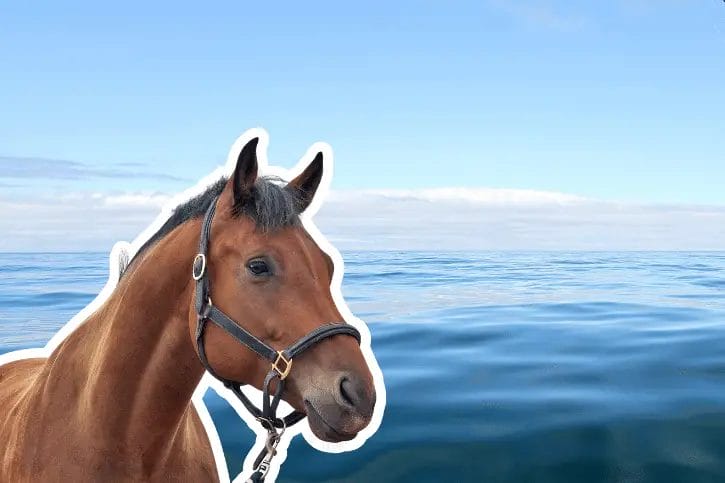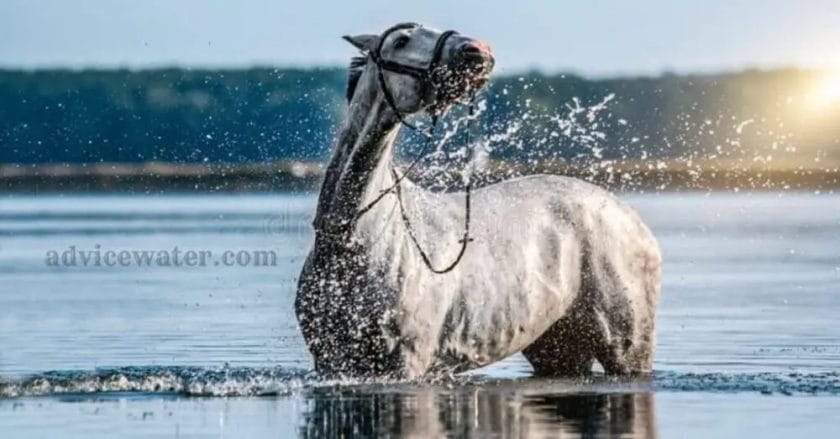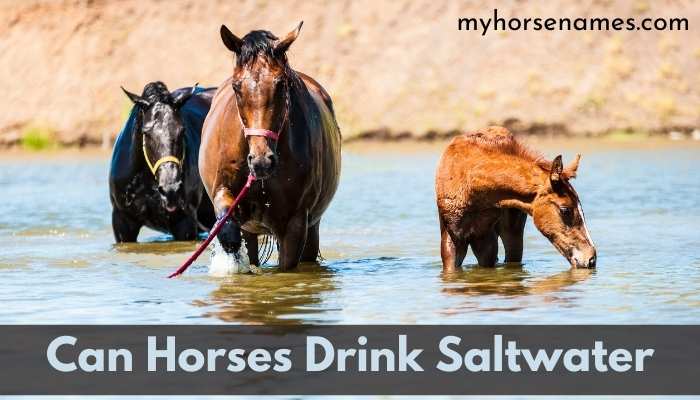Horses should not drink saltwater as it can be harmful to their health. Unlike some marine animals, horses are not adapted to consume high levels of salt. Drinking saltwater can lead to dehydration, electrolyte imbalances, and organ damage in horses. It is important to provide horses with clean and fresh drinking water to keep them hydrated and healthy.

Understanding the Effects of Salt Water on Horses’ Health
Horses are magnificent creatures that require proper care and attention to ensure their health and well-being. One aspect of their care that deserves particular consideration is their hydration. Water plays a vital role in a horse’s overall health, and it is essential to understand the effects of different types of water on horses, including salt water.
When we think of salt water, we typically associate it with the ocean. But did you know that salt water can also be found in other environments, such as lakes, rivers, and even some underground sources? Although horses are not commonly exposed to salt water in their natural habitats, accidents or unusual circumstances can lead to their ingestion of this type of water.
So, what happens when horses consume salt water? The high sodium content in salt water can have several adverse effects on their health. One of the immediate consequences is dehydration. While it may seem counterintuitive, salt water actually dehydrates the body rather than hydrating it. The excess sodium in the water draws fluids from the horse’s cells, leading to an imbalance in the body’s electrolytes and a decrease in overall hydration.
Dehydration can have severe consequences for horses, including decreased performance, lethargy, and even organ failure if left untreated. Therefore, it is vital to recognize the signs of dehydration in horses and take immediate action to restore their hydration levels.
Another significant effect of salt water on horses’ health is its impact on the digestive system. The high sodium content can irritate the lining of the gastrointestinal tract, leading to inflammation and discomfort. Horses may experience symptoms such as colic, diarrhea, and reduced appetite. These digestive issues can further exacerbate dehydration and lead to nutrient deficiencies if not addressed promptly.
In addition to dehydration and digestive problems, salt water can also affect a horse’s skin and coat. The high salt concentration can dry out the skin, leading to itchiness, flaking, and overall poor coat condition. It may also cause irritation and discomfort, making the horse more susceptible to skin infections and other dermatological issues.
Prevention is key when it comes to safeguarding horses from the negative effects of salt water. It is important to ensure that their water sources are clean, fresh, and free from excessive salt content. Regular monitoring of water quality, especially in areas where salt water may be present, can help identify any potential risks and take appropriate measures to protect the horses.
In summary, understanding the effects of salt water on horses’ health is crucial for providing them with the care they need. Salt water can lead to dehydration, digestive issues, and skin problems in horses. Taking preventive measures and ensuring access to clean and fresh water sources is essential for maintaining their overall well-being. By prioritizing their hydration and monitoring their water sources, we can ensure that horses thrive and lead healthy lives.

Alternative Hydration Options for Horses in Saltwater Environments
In saltwater environments, horses face unique challenges when it comes to staying hydrated. The high salt content in the water can lead to dehydration and electrolyte imbalances, which can have detrimental effects on their health and performance. To address this issue, horse owners and caretakers need to explore alternative hydration options that can provide the necessary fluids and electrolytes without compromising the horse’s well-being. In this section, we will discuss some effective alternatives for hydrating horses in saltwater environments.
1. Freshwater Supply
The simplest and most effective solution is to provide horses with a freshwater supply, separate from the saltwater source. This can be achieved by installing a freshwater trough or using a portable water container that can be regularly refilled. It is important to ensure that the freshwater supply is easily accessible to the horses and is kept clean and free from contaminants.
2. Electrolyte Supplements
In addition to freshwater, electrolyte supplements can play a vital role in maintaining the horse’s electrolyte balance. These supplements are specifically formulated to replace the essential minerals lost through sweating and can be added to the horse’s drinking water or administered orally. It is crucial to follow the recommended dosage and consult a veterinarian for guidance on the best electrolyte supplement for each individual horse.
3. Hydration Pellets or Mash
Hydration pellets or mash can be an effective way to encourage horses to drink more fluids. These specially formulated feeds can be mixed with water to create a palatable mash that is high in moisture content. The flavors and textures can entice horses to consume more liquids, promoting hydration even in saltwater environments. Care should be taken to ensure that the pellets or mash are free from excessive salt content.
4. Regular Monitoring and Hydration Schedule
In saltwater environments, it becomes even more crucial to monitor horses’ hydration levels. Regular observation and assessment of the horse’s urine color, skin elasticity, and overall demeanor can provide valuable insights into their hydration status. Establishing a hydration schedule that includes frequent check-ins and providing access to freshwater at regular intervals can help prevent dehydration and maintain optimal hydration levels.
5. Shade and Cooling Measures
Hot and humid environments can exacerbate dehydration in horses. Providing shade and cooling measures such as fans or misting systems can help lower the ambient temperature and reduce the horse’s water loss through excessive sweating. Creating a comfortable and cool environment can encourage horses to drink more and stay properly hydrated.
6. Saltwater Adaptation
In some cases, horses can gradually adapt to drinking small amounts of saltwater. This method should only be considered under the guidance of a veterinarian and with caution. The adaptation process involves slowly introducing small quantities of saltwater into the horse’s diet while closely monitoring their health and hydration levels. It is important to note that not all horses may be suitable for saltwater adaptation, and individual tolerance may vary.
In summary, horses in saltwater environments require alternative hydration options to combat the challenges posed by the high salt content. Providing freshwater supply, electrolyte supplements, hydration pellets or mash, regular monitoring, shade and cooling measures, and potentially exploring saltwater adaptation under professional guidance can help ensure that horses remain hydrated and healthy in these unique environments.

Tips for preventing dehydration in horses near salt water sources
Dehydration is a common problem that can affect horses, especially when they are near salt water sources. Salt water may entice horses to drink more, but it can actually worsen dehydration due to its high salt content. Therefore, it is important for horse owners to take certain precautions to prevent dehydration in their equine companions. Here are some useful tips to keep in mind:
1. Provide access to fresh water
Ensure that your horse has access to fresh, clean drinking water at all times. This is essential for maintaining hydration levels. If you are near a salt water source, make sure to bring enough fresh water with you or find a nearby freshwater supply for your horse to drink from.
2. Limit exposure to salt water
While it may be tempting for horses to drink water from the salt water source, it is crucial to prevent them from doing so. Salt water intake can lead to dehydration and other health issues. Keep your horse away from salt water sources and discourage them from drinking it.
3. Provide electrolyte supplements
In hot weather or during strenuous exercise, horses may lose electrolytes through sweat. Electrolytes are essential for maintaining proper hydration and bodily functions. Consider providing electrolyte supplements to your horse to replenish these vital minerals and prevent dehydration.
4. Offer frequent water breaks
During rides or activities near salt water sources, make sure to offer your horse frequent water breaks. Allow them to drink from their own fresh water supply or seek out a freshwater source along the way. This will help keep them hydrated and prevent any temptation to drink from the salt water.
5. Monitor hydration levels
Regularly check your horse’s hydration levels by monitoring their urine color and skin elasticity. Dark urine and slow skin recoil may indicate dehydration. If you notice any signs of dehydration, take immediate action to rehydrate your horse and seek veterinary advice if necessary.
6. Provide shade and rest breaks
When horses are exposed to high temperatures or engaging in strenuous activities, they are more prone to dehydration. Provide shade and rest breaks to allow your horse to cool down and recover. This will help prevent excessive fluid loss and maintain hydration levels.
7. Adjust exercise intensity and duration
During periods of extreme heat or high humidity, it is important to adjust the intensity and duration of your horse’s exercise routine. This will help prevent excessive sweating and fluid loss. Be mindful of your horse’s energy levels and hydration status during these conditions.
8. Consult with a veterinarian
If you have concerns about your horse’s hydration or need further guidance on managing dehydration risks near salt water sources, consult with a veterinarian. They can provide specific advice tailored to your horse’s needs and help ensure their well-being.
In summary, preventing dehydration in horses near salt water sources requires proactive measures such as providing access to fresh water, limiting exposure to salt water, offering electrolyte supplements, providing frequent water breaks, monitoring hydration levels, providing shade and rest breaks, adjusting exercise intensity and duration, and consulting with a veterinarian. By following these tips, you can help keep your horse properly hydrated and minimize the risk of dehydration-related health issues.
Signs and Symptoms of Saltwater Poisoning in Horses
Saltwater poisoning, also known as hypernatremia, can occur in horses when they consume excessive amounts of saltwater. This condition can be extremely dangerous and potentially life-threatening if not promptly recognized and addressed. It is essential for horse owners and caretakers to be aware of the signs and symptoms of saltwater poisoning in horses to ensure quick intervention and proper treatment.
1. Increased Thirst and Urination: One of the initial signs of saltwater poisoning in horses is increased thirst and urination. Horses may drink more water than usual and have a frequent need to urinate. This excessive water intake is a result of the body’s attempt to dilute the high levels of sodium from the saltwater.
2. Lethargy and Weakness: As saltwater poisoning progresses, horses may exhibit signs of lethargy and weakness. They may appear tired, lack energy, and show reluctance to engage in physical activity or movement. This is due to the disruption of the body’s electrolyte balance caused by the high sodium levels.
3. Loss of Appetite: Horses suffering from saltwater poisoning may experience a loss of appetite. They may refuse to eat or show disinterest in their usual feed. This reduced appetite can further exacerbate the weakness and lethargy observed in affected horses.
4. Abnormal Behavior: Saltwater poisoning can also cause changes in a horse’s behavior. Affected horses may display restlessness, agitation, or irritability. They may exhibit signs of discomfort or appear unsettled due to the physiological imbalances caused by the excessive salt intake.
5. Gastrointestinal Disturbances: The consumption of saltwater can lead to gastrointestinal disturbances in horses. Horses may experience diarrhea, colic-like symptoms, or even vomiting. These digestive issues are a result of the body’s attempt to eliminate the excess salt and restore normal electrolyte levels.
6. Dehydration: Saltwater poisoning can result in severe dehydration in horses. The high sodium content in saltwater draws water out of the body’s cells, leading to fluid imbalances and dehydration. Dehydrated horses may have dry mucous membranes, sunken eyes, and decreased skin elasticity.
7. Neurological Signs: In severe cases of saltwater poisoning, horses may exhibit neurological signs. These can include disorientation, stumbling, tremors, seizures, or even coma. These neurological symptoms indicate a critical condition and require immediate veterinary attention.
It is important to note that the severity and progression of symptoms may vary depending on the amount of saltwater consumed and the overall health of the horse. If you suspect saltwater poisoning in your horse, it is crucial to contact a veterinarian immediately for proper diagnosis and treatment. Delayed intervention can have serious consequences and may be fatal for the affected horse.
FAQs
Can horses drink salt water?
No, horses should not drink salt water. Salt water can cause dehydration and electrolyte imbalances in horses. It is important to provide horses with fresh, clean water to meet their hydration needs.
Conclusion:
In conclusion, horses should not drink saltwater as it can be harmful to their health. While horses can tolerate small amounts of salt in their diet, consuming large quantities of saltwater can lead to dehydration, electrolyte imbalances, and kidney damage. It is crucial to provide horses with freshwater to ensure proper hydration and overall well-being.
Additionally, saltwater is not a suitable source of hydration for horses due to its high salt content. Providing access to clean and fresh water is essential for maintaining the horse’s health and preventing potential complications. It is recommended to regularly monitor and refill water sources to guarantee that horses have an ample and clean water supply at all times.
